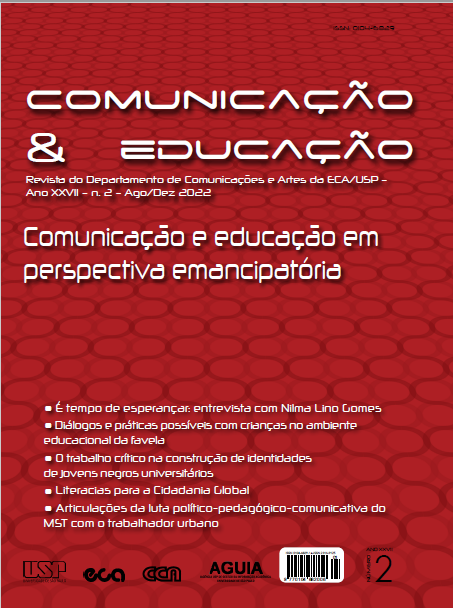Literacies for Global Citizenship
DOI:
https://doi.org/10.11606/issn.2316-9125.v27i2p183-198Keywords:
Literacy, Information Disorder, Media Ecosystem, 21st Century, Literacy for Global CitinzenshipAbstract
This text discusses the relevance and principles of the concept of literacies for global citizenship. After describing historically, the emergence and framing the literacy concept in the sixties of the last century, the factors that impel its expansion in a global world are addressed. The understanding of reading the world is described, as the ability to seek, aggregate and interpret information, from multiple sources and devices, with the aim of understanding phenomena and situations. It is argued that the objective of global citizenship should address all social groups, identified by their own characteristics and deserving of specific approaches. The methodology used is supported by the bibliographic review and the essayistic and exploratory nature of the explanation is assumed.
Downloads
References
ALBRIGHT, Jonathan. Welcome to the era of fake news. Media and Communication, vol 5, n 2, 2017, p. 87-89.
ANDERSON, Chris W. Towards a sociology of computational and algorithmic journalism New Media & Society, vol 15, n 7, 2012, p. 1005-1021.
BRAGA, Inês; LOPES, Maria da Conceição Oliveira Literacia como fundamento da cidadania. 8º LUSOCOM. Anais, 2009, p. 1941-1956.
COCCO, Giuseppe; VILARIM, Gilvan. O capitalismo cognitivo em debate Reserach Gate Liinc em Revista, v 5, n 2, 2009, p. 148-151. https://www.researchgate.net/publication/314196231_O_capitalismo_cognitivo_em_debate_Cognitive_Capitalism_in_debate
CUNHA, Isabel Ferin O jornalismo na era do populismo mediatizado. Estudos em Jornalismo e Mídia, v 16, n 2, 2019, p.9-22 DOI: https://doi.org/10.5007/1984-6924.2019v16n2p09.
FERGUSON, Niall; ZAKARIA, Fareed A ordem liberal internacional terá chegado ao fim? Lisboa, Gradiva, 2019.
FIGUEIRA, João; SANTOS, Sílvio As fake News e a nova ordem (des)informativa na era da Pós-verdade. Coimbra, Imprensa da Universidade de Coimbra, 2019.
GONZALEZ, Ana Maria Introducción: emociones y análisis social, p. 9-24. In: FLAMARIQUE, Lurdes e D’OLIVEIRA-MARTINS, Madalena (Eds.). Emociones y estilos de vida: radiografia de nuestro tiempo. Madrid: Biblioteca Nova, 2013
GOODFELLOW, Robin Literacy, literacies, and the digital in higher education. Teaching in Higher Education, v 16, n 1, 2011, p. 131-144.
HOBBS, Renee Digital and Media Literacy: a Plan of Action.Washington, The Aspen Institute, 2010. https://assets.aspeninstitute.org/content/uploads/2010/11/Digital_and_Media_Literacy.pdf.
HOBBS, Renee The State of Media Literacy Education The Journal of Communication, vol 55, n 4, 2005, p. 865-871 http://www3.interscience.wiley.com/cgi-bin/fulltext/118645483/PDFSTART
KURBANOGLU, Serap ;SPIRANEC, Sönja; GRASSIAN, Esther; MIZRACHI, Diane ; CATTS; Ralph (Eds.) Lifelong Learning and Digital Citizenship in the 21st Century, Dubrovnik, Spring, 2014.
MACEDO, Lurdes Educação e Literacia Para os Media na Promoção da Cidadania In Atas 4º Congresso da Associação Portuguesa de Ciências da Comunicação, 4o SOPCOM, Aveiro, Comissão Editorial da Universidade de Aveiro URL:http://bocc.ubi.pt/pag/macedo-lurdes-esducacao-literacia-para-media-promocao- cidadania.pdf.
MACHADO, Monica; BURROWES, Patricia; RET, Lucimara Proposta de um modelo de literacias para as novas enunciações publicitárias Revista Interamericana de Comunicação Midiática v 19, n 40, 2020.
MALMELIN, Nando. What is advertising literacy?: Exploring the dimensions of advertising literacy, Journal of Visual Literacy, v. 29, n 2, 2010, p. 129-142.
MARTIN, Allan; GRUDZIECKI, Jan DigEuLit: Concepts and Tools for Digital Literacy Development. ITALICS Innovations in Teaching and Learning in Information and Computer Sciences vol 5, n 4, 2006. https://www.researchgate.net/publication/26467562_DigEuLit_Concepts_and_Tools_for_Digital_Literacy_Development
MARTINS, Sheila Wesley; MARTINS, Joaquim Welley; ALVES, Fernanda Maria Melo Literacia digital como competência para a cidadania global https://ieducacao.ceie-br.org/literaciadigital/
NETO, Antonio Fausto Olhares sobre a recepção através das bordas da circulação... Atas XVIII Encontro da Compós, Belo Horizonte, MG, 2009, p. 1-13.
OBERCOM Literacias na sociedade dos Ecrãs Lisboa, Obercom, 2018. https://obercom.pt/literacias-na-sociedade-dos-ecra%cc%83s/
.
OBSERVATÓRIO DE IMPRENSA, Brasil. O Brasil é terreno fértil para fake news. http://www.observatoriodaimprensa.com.br/;
PAPACHARISSI, Zizi Toward New Journalism(s). Affective News, Hybridity, and luminal Spaces Journalism Studies, v 16, 2014, p. 27-40.
PRADO, Jose Luiz Aidar; PRATES, Vinícius. Regimes passionais do MBL na eleição presidencial de 2018. Revista e-Compós, vol 24, 2021. DOI:
https://doi.org/10.30962/ec.2107
SADOWSKI, Jathan. When data is capital: datafication, accumulation, and extraction. Big Data & Society, Jan-Jun, 2019, p. 1-12.
SANTOS, Rita; AZEVEDO, José; PEDRO, Luís Literacia(s) digital(ais): definiçõeses, perspetivas e desafios, Revista Media& Jornalismo, vol. 15, n 27, 2015,p. 17-44 DOI:
https://doi.org/10.14195/2183-5462_27_1
SERRANO-PUCHE, Javier Internet and Emotions: New trends in an Emerging Field of Research Revista Comunicar, vol 24, n 46, 2016, 19- 26.
SOUTHWELL, Brian. G.; THORSON, Emily A.; SHEBLE, Laura (Eds.). Misinformation and mass audiences Austin, University of Texas Press, 2018.
TAMBINI, Damian Fake News: Public Policy Responses. Media Policy Brief 20. London, Media Policy Project, London School of Economics and Political Science, 2017.
UNESCO Alfabetização Midiática e Informacional: diretrizes para a formulação de políticas e estratégicas Brasília, UNESCO, 2013, 2016. https://unesdoc.unesco.org/ark:/48223/pf0000246421.
VOLKOFF, Vladimir Pequena história da desinformação Lisboa, Editorial Notícias, 2000.
ZAKARIA, Fareed Dez licões para um mundo pós-pandemia Lisboa, Gradiva, 2020.
ZELIC, Helena et al. (Orgs.) Capitalismo digital, comunicação e construção de movimento: trilhas feministas, São Paulo, SOF, 2020 (Coleção Cadernos Sempreviva, v.17. Série Economia e Feminismo, n. 6) https://www.sof.org.br/wp-content/uploads/2021/01/Caderno_Capitalismo_digital_comunicacao_movimento_sof_web-1.pdf
Downloads
Published
Issue
Section
License
Copyright (c) 2022 Isabel Maria Ribeiro Ferin Cunha

This work is licensed under a Creative Commons Attribution 4.0 International License.
I authorize the publication of the submitted article and soon the copyrights to the magazine, in the printed and electronic version, if it is approved after the evaluation of the reviewers.
I understand that readers may use this article without prior request, provided the source and authorship are mentioned. Readers are not authorized to use this article for reproduction, in whole or in part, for commercial purposes.

































